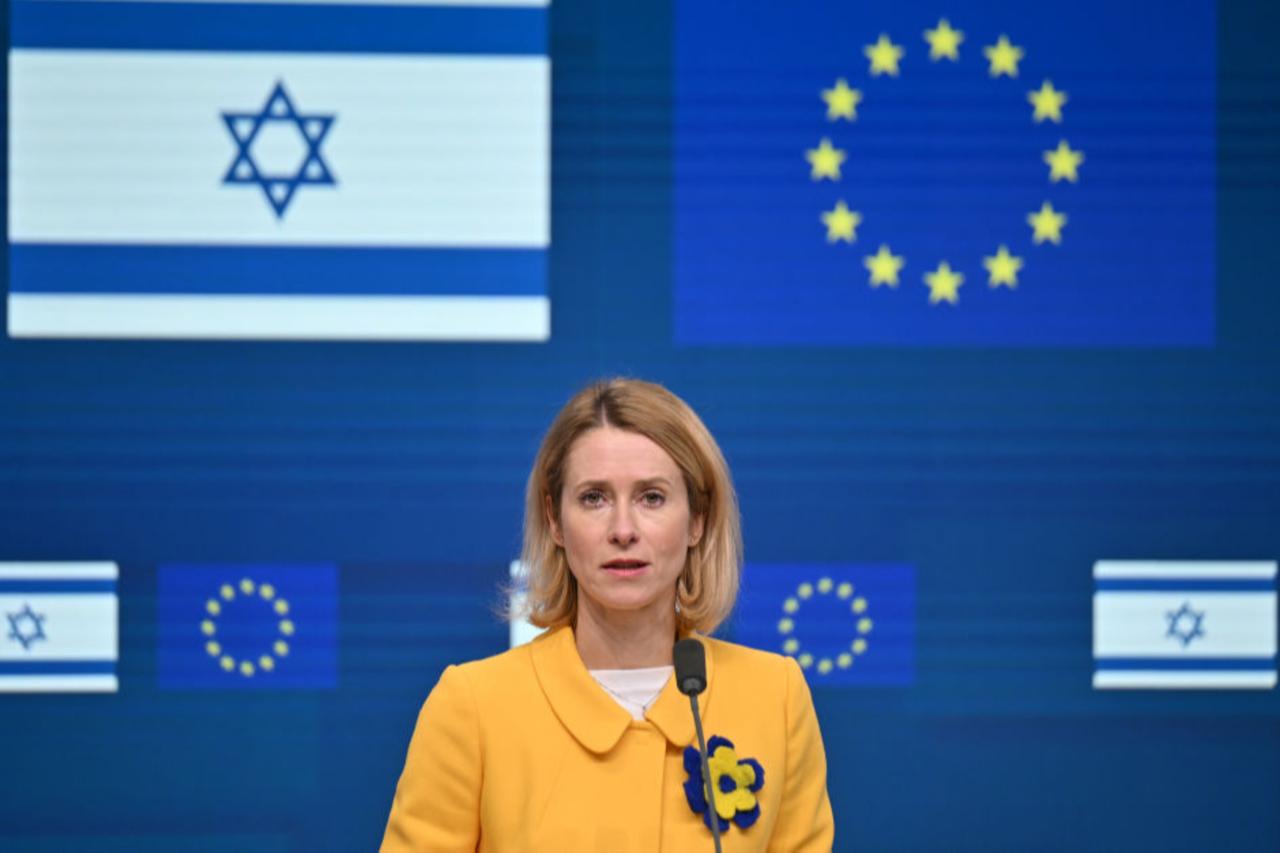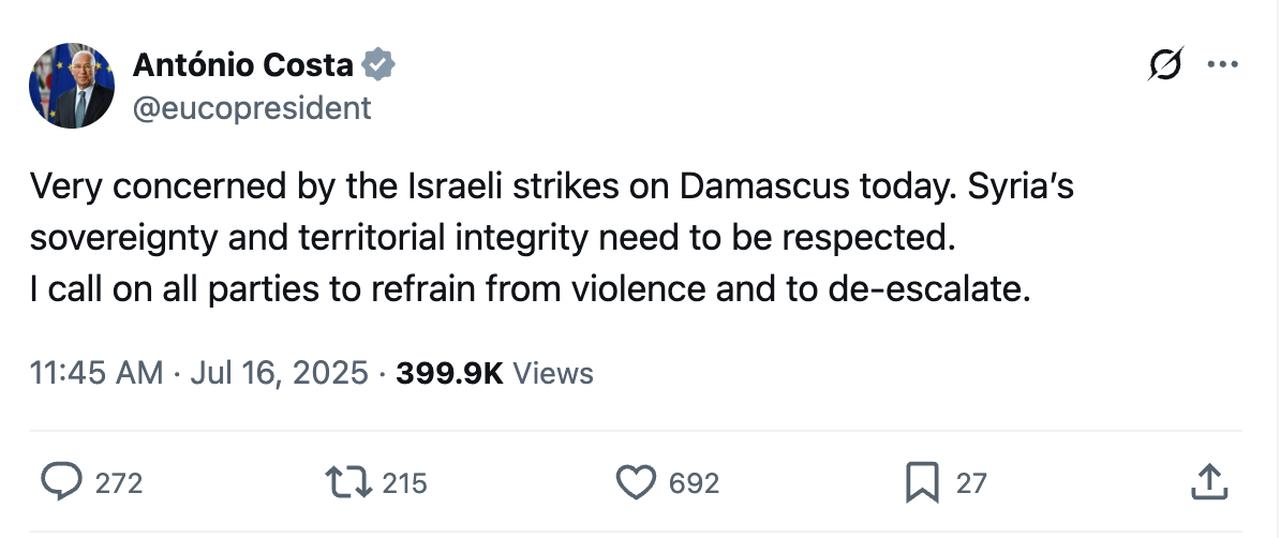
European Union foreign ministers gathered in Brussels to debate possible sanctions on Israel on Tuesday, July 15. Vice President of the EU Commission Kaja Kallas described the moment as “historic,” with both Israeli and Palestinian representatives present at the table.
The 27 EU foreign ministers agreed to delay taking any action against Israel after examining an exhaustive list of 10 options to respond to Israel's breach of the EU-Israel Association Agreement over its grave failure to respect Palestinian human rights.
Former EU High Representative for Foreign Affairs and Security Policy Josep Borrell criticized the EU Council for failing to act on Israel’s violations of the human rights clause embedded in the agreement.
Indeed, this decision demands more attention than any taken in Washington, because when it comes to Israel, the EU holds a quieter, often underestimated hand.
Unlike Washington, which builds its influence around security ties, Brussels draws its weight from being Israel’s largest trading partner and holds sway over key sectors of its economy.
It also exerts legal and regulatory pressure tied to market access and human rights obligations. European political engagement tends to avoid provoking Israel’s defensive reflexes, thanks in part to the absence of a security guarantee.
Also, European public opinion, far more critical of Israeli policies than the bipartisan support in the U.S., continues to shape the space in which EU leaders operate.

For decades, the United States has been Israel’s primary military ally and diplomatic supporter. Yet when it comes to practical influence, the kind that can shape Israeli policy without risking its security, the European Union holds a stronger, often underestimated hand.
The EU is Israel’s largest trading partner, accounting for nearly 30% of the country’s total exports and imports. In 2024, total trade between the EU and Israel reached €42.6 billion, significantly outpacing Israel’s trade with the United States, which stood at €31.6 billion in the same year.
Europe’s economic relationship with Israel extends far beyond trade. The EU is also the largest foreign investor in Israel by a considerable margin. In 2023, EU member states collectively held €72.1 billion in foreign direct investment (FDI) in Israel, nearly double the United States’ €39.2 billion.
The Netherlands alone accounted for two-thirds of the EU’s investment, making it Israel’s top investor worldwide. Dutch firms held €50 billion in investments in Israel in 2023, surpassing even U.S. investments.
Conversely, Israel’s outbound investments also flow primarily toward Europe. Israeli companies invested €65.9 billion in the EU in 2023, compared to just €8.8 billion in the U.S., making the EU Israel’s main destination for foreign investment.
Despite Israel’s continued occupation of Palestinian territories and the ongoing military campaign in Gaza, EU exports to Israel increased by €1 billion, reaching €25.5 billion in 2023 and €26.7 billion in 2024.
This trade and investment pattern underscores Europe’s central role in Israel’s economic life, a relationship that gives Brussels tangible leverage over key sectors of the Israeli economy and its global financial ties.

Israel’s privileged access to the European single market comes with conditions, as it does for anyone else who has trade ties with the continent.
Trade relations with the EU hinge on adherence to certain norms, particularly human rights provisions embedded in association agreements.
Unlike the United Nations, where the U.S. routinely shields Israel from censure, the EU applies regulatory pressure that can affect Israeli businesses directly, and as a matter of fact, it’s obliged to per its own rules.
This legal leverage has compelled Israeli firms and banks to adjust operations, particularly those linked to settlement activities in the occupied territories.
Such regulatory scrutiny, enforced by Brussels, has had a measurable impact on Israeli economic practices, a form of influence Washington does not possess that strongly.

Europe’s political posture toward Israel offers another distinct advantage. Unlike the United States, the EU is not seen as a security guarantor.
This means that European criticism or conditional cooperation does not provoke the defensive reactions often triggered by American pressure.
Major EU economies, notably Germany, France, and the Netherlands, wield political influence through their economic partnerships.
Their ability to voice criticism or attach conditions to bilateral relations gives them leverage over Israeli decision-making without risking a rupture in relations or pushing Israel toward a defensive posture.

Public opinion within Europe also plays a role in shaping the political space for action. Unlike the United States, where bipartisan support for Israel remains strong, European public sentiment has become increasingly critical of Israeli policies, particularly concerning Gaza and the West Bank.
This critical perspective is starting to influence European policymakers, providing political cover for tougher stances or conditional engagement with Israel.
The intersection of public scrutiny, political will, and economic leverage further enhances Europe’s ability to influence Israeli actions.
These factors also offer Europe, which is already at odds with the Trump administration on key issues, a leverage point it could choose to wield against the U.S., reminding Washington of the weight its alliance still carries.
While the United States remains Israel’s key security partner, the European Union holds decisive leverage across trade, investment, legal frameworks, and public diplomacy.
Europe’s position as Israel’s largest trading partner, its top foreign investor, and a primary regulatory gatekeeper grants Brussels influence over Israel in ways Washington cannot easily replicate.
This multi-dimensional engagement spanning economic, legal, and political spheres places the EU at the heart of any serious effort to influence Israeli policy today.